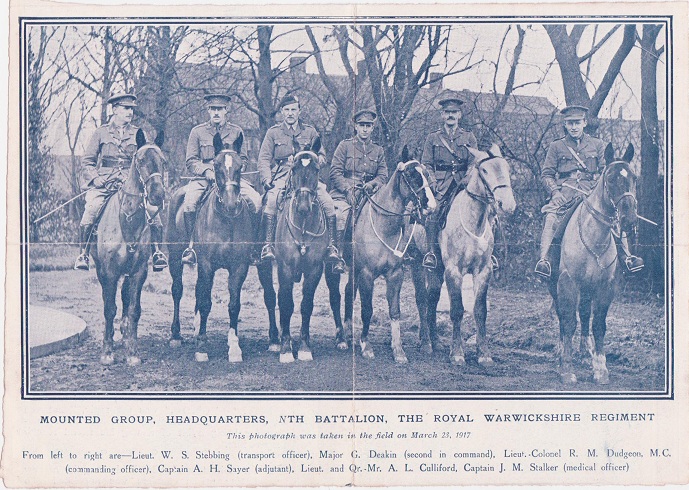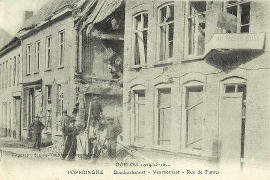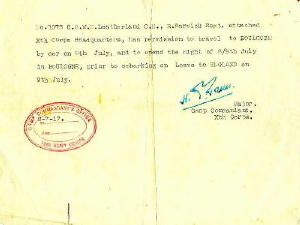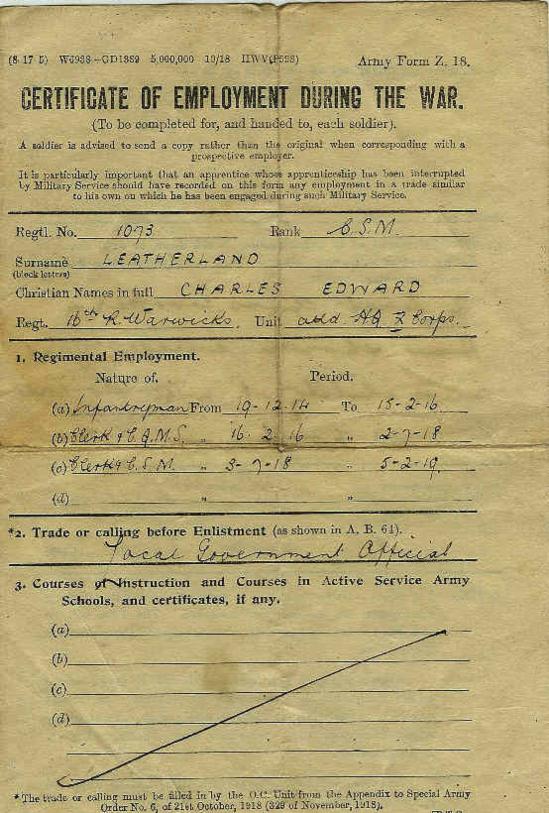COMPANY SERGEANT MAJOR LEATHERLAND
When the First World War began in 1914, Charles was only 16. You were supposed to be 18 or over to join the army. But along with many other boys who were anxious to serve their country, Charles persuaded the recruiting officer that he was 18 years old. He joined the 16th Battalion of the Royal Warwickshire Regiment.
ROYAL WARWICKSHIRE REGIMENT

Leatherland served in the army for 5 years in Belgium, France and Germany. He trained as an infantryman and gunner.
In 1977 Leatherland wrote his recollections of the War for the Peter Liddle Personal Experience war archives. Here are some excerpts for the early years in which he describes the trip to France :
"Before 1915 was out shilling-a-day Private Leatherland and the rest of the 16th battalion Royal Warwickshire Regiment went out to France. We went from Folkestone to Boulogne in an old cattle steamer, which still contained evidence of its previous use. From Boulogne we were packed into French railway cattle trucks, bearing the usual painted signs "10 Chevaux, 40 hommes" [10 horses, 40 men], and we drew up at the little town or village of Longpre, north of Amiens. Cattle haunted us again here for it was in cowsheds that most of us were billeted."
"The support trenches, running in wriggly patterns from west to east, were a credit to the engineers who had built them out of wide expanses of farm fields. They were deep, well over seven feet. Thier walls were vertical, and there were duckboards on the floor. A hundred yards or so forward, however things had changed. Sides had fallen in. Duckboards were often missing. We had to wade, rather then walk, for much of the way."

In early 1916 he was transferred from the 16th battalion to Xth Corps Headquarters as a clerk where his clerical and shorthand skills were needed. The Corps was an intermediate level in the army command chain. The Xth Corps remained in the Ypres area and Flanders for most of the war.
In 1917 Leatherland became Quarter Master Sergeant, in charge of stores. By 1918 he had been promoted to acting Company Sergant Major. He was only 20 and later claimed to have been the youngest Company Sergeant Major in the First World War. For a time he acted as Chief Clerk to the Camp Commandant.

Company Sergeant Major Leatherland (middle row far right)
"In 1916 I left the battalion and moved about to various stations : Abeele, just behind Poperinghe, where many of my colleagues lived and worked in a convent, and where King George V came to review us. Toutencourt, somewhere north of Amiens, where my old colonel was killed by a stray shell. He was buried in the parish church there at the top of the hill. The village of Long, where the River Somme ran along the south side, and where I had to put two of my men "on the peg" for taking bread from the stores and using it as an inducement to secure the favours of two young women who lived to the north of the viillage. I was by this time a company quarter master sergant, and soon afterwards became company sergeant major".

"The great flu epidemic of 1917 played havoc with our troops. I was then stationed somewhere behind Arras ....I remember one of our captains a physically perfect tough Australian died within hours of being stricken by the disease. Like many others I caught it myself. But after the second day my unit had to move 50 miles away. I was not fit to move. So I was left alone in the quartermaster stores , all alone, the sole Briton in the village without even the locals knowing I was there. I had to feed myslef on army biscuits. I saw not a soul for a week. I was alone with my thoughts and they were far from pleasant."
(Leatherland war memoirs Liddle Archive)

Company Sergeant Major Leatherland
The German Prisoner
Leatherland's war memoirs include the tale of the time when he had to guard a German prisoner of war who was ordered to drive a steam train. Would the prisoner seize control of the train ? Would he push Charles off the train to his death ? How would Charles drive the train if the prisoner broke free and jumped off the train ? It was an adventure which he often told his grandchildren.

The Kaiser's Sister
Another story he told took place in 1919 after the end of the war :
"One more matter, while we were in Bonn, is perhapsworth mentioning. The Kaiser's sister, Princess Viktoria of Schaumburg-Lippe, had a chateau on the borders of the town. I had to find some stabling for my colonel's two horses, which he had had sent out from his home in Luton.
I was told by the German liaison office that Princess Victoria had some excellent stables. So I asked him to go and see her and ask her if my colonel's horse could be out in her stables.
He came back to me and told me that the Princess absolutely refused to agree. I said to myself "We have won the war. She has lost it. And so our way is going to prevail !
So I went and told her that if we did not get use of the stables, I would have the whole mansion commandeered. So she gave way".



"And so when I went to see her, on the day I was to come back to England on demobilisation, to thank her for what she had done and to say goodby, she gave me a portrait of herself, which is perhaps somewhere in the house. She had been inviting me round to tea every Wednesday afternoon, when she had the aristocrats of Bonn as her guests.
My colonel was Harold P. Green, who was chairman of the Harold Green brewery at Luton. When I left him at Bonn, he said : "If you ever want a job, come round to the brewery." So I had to tell him that my pre-war job with the Birmingham Corporation was awaiting me.
I often wonder whether I would have become a brewey owner if I had answered him differently."Despite being technically on the German side in World War I, Viktoria was very sympathetic to the British cause. After the war, she met her cousin, George V, King of Great Britain and expressed the wish that they would all be friends again soon. George told her he did not think this would be possible for a great many years".
Although as a German citizen, Princess Victoria was clearly on the German side, she was known to be very sympathetic to the British cause during WW1, perhaps because of her links to British royalty (she was a grandaughter of Queen Victoria and thus a cousin of King George V).
